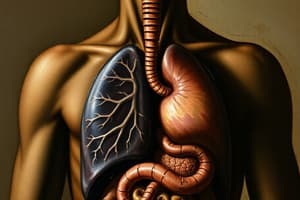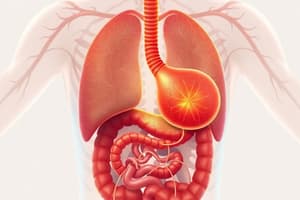Podcast
Questions and Answers
The trachea is the main organ responsible for gas exchange in the body.
The trachea is the main organ responsible for gas exchange in the body.
False (B)
The diaphragm is a muscle that helps in breathing, allowing for the volume of the chest cavity to change.
The diaphragm is a muscle that helps in breathing, allowing for the volume of the chest cavity to change.
True (A)
Capillaries are the smallest blood vessels and are involved in transporting blood directly to the heart.
Capillaries are the smallest blood vessels and are involved in transporting blood directly to the heart.
False (B)
The large intestine is responsible for absorbing most of the nutrients from food.
The large intestine is responsible for absorbing most of the nutrients from food.
Veins carry oxygen-rich blood away from the heart.
Veins carry oxygen-rich blood away from the heart.
The endocrine system, through the production of hormones, plays a significant role in regulating blood sugar levels.
The endocrine system, through the production of hormones, plays a significant role in regulating blood sugar levels.
During exercise, breathing rate decreases to conserve oxygen.
During exercise, breathing rate decreases to conserve oxygen.
The liver and pancreas are both organs within the digestive system that help with fat digestion and blood sugar regulation.
The liver and pancreas are both organs within the digestive system that help with fat digestion and blood sugar regulation.
Flashcards
Respiratory System
Respiratory System
Body system providing oxygen and removing carbon dioxide.
Lungs
Lungs
Main organ where gas exchange occurs in the respiratory system.
Alveoli
Alveoli
Tiny air sacs in the lungs for gas exchange.
Diaphragm
Diaphragm
Signup and view all the flashcards
Digestive System
Digestive System
Signup and view all the flashcards
Small Intestine
Small Intestine
Signup and view all the flashcards
Heart
Heart
Signup and view all the flashcards
Red Blood Cells
Red Blood Cells
Signup and view all the flashcards
Study Notes
Respiratory System
- Function: Provides oxygen to the body and removes carbon dioxide.
- Main Organs:
- Lungs: Main organ where gas exchange occurs.
- Trachea: Air passes through to reach the lungs.
- Bronchi & Bronchioles: Tubes directing air into the lungs.
- Alveoli: Tiny air sacs for oxygen intake and carbon dioxide release. Alveoli are one cell thick for efficient gas exchange, have a large surface area, blood capillaries for fast gas exchange.
- Diaphragm: Muscle assisting breathing.
- Process:
- Oxygen inhaled into the lungs.
- Oxygen diffuses into the blood.
- Carbon dioxide removed from the blood and exhaled.
- During Exercise:
- Breathing rate increases for more oxygen.
- More carbon dioxide is removed.
- Deep breathing improves oxygen intake.
Digestive System
- Function: Breaks down food into usable nutrients.
- Main Organs:
- Mouth: Breaks down food using teeth and saliva.
- Esophagus: Moves food to the stomach.
- Stomach: Digests food using acid and enzymes.
- Small Intestine: Absorbs nutrients into the blood. Villi in the small intestine increase surface area for absorption; blood capillaries absorb nutrients.
- Large Intestine: Absorbs water and forms waste.
- Liver & Pancreas: Aid in digesting fats and regulating blood sugar.
Circulatory System
- Function: Transports oxygen, nutrients, and waste throughout the body.
- Main Organs:
- Heart: Pumps blood.
- Blood Vessels:
- Arteries: Thick walls, carry oxygen-rich blood away from the heart.
- Veins: Thin walls, carry oxygen-poor blood back to the heart.
- Capillaries: Tiny network for gas exchange, connecting veins and arteries.
- Blood Components:
- Red Blood Cells: Carry oxygen.
- White Blood Cells: Fight infection.
- Platelets: Aid in blood clotting.
- Plasma: Carries nutrients and waste.
- During Exercise:
- Heart rate increases to deliver more oxygen to muscles.
- More carbon dioxide is removed through the lungs.
Endocrine System
- Function: Produces hormones to regulate bodily functions.
- Main Glands & Hormones:
- Pancreas: Produces insulin to control blood sugar levels.
- Adrenal Glands: Produce adrenaline for the "fight or flight" response (e.g., increase in heart rate).
- Thyroid: Produces thyroxin to regulate metabolism.
- Pituitary Gland: Controls other glands, produces growth hormone and antidiuretic hormone.
- Reproductive glands: -Ovaries in females produce estrogen and progesterone. -Testes in males produce testosterone.
Nervous System
- Function: Controls body movements and responses.
- Main Parts:
- Brain: Processes information and controls actions.
- Spinal Cord: Sends signals between the brain and the body.
- Nerves: Carry messages to and from the brain.
- Neurons: These nerve cells are made up of cell bodies, dendrites, axon, and myelin sheath. Dendrites receive signals, axon transmits signals, myelin sheath insulates axon for faster signal transmission.
- Types of Responses:
- Voluntary: Controlled movements (e.g., catching a ball).
- Reflexes: Automatic responses (e.g., pulling hand from heat).
- Reflex Arc: Description of how reflexes work.
Studying That Suits You
Use AI to generate personalized quizzes and flashcards to suit your learning preferences.




